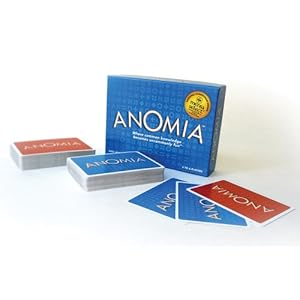After the conclusion of last Saturday's mini-puzzlehunt, we wanted to play a game that we could all participate in. Someone suggested Anomia, a quick party-friendly card game. I had never played before, but I enjoyed it enough to make it October's Game of the Month.
Style and Gameplay
Anomia is a word-association game with a card-collection mechanic. Each card is printed with the name of a category (such as "TV shows" or "cleaning products") and a symbol (for instance, a yellow diamond or a purple wavy line). On your turn, you flip over a card from a central deck and put it face-up in front of you. The next person draws the next card and so on, until two players have face-up cards with the same symbol.
That triggers a "face-off" between the two players: the first person to name an item that fits into the other person's category wins, takes the card, and gets a point. For example, say I'm showing the card "US presidents" with a blue pound sign, and you flip the card "lakes" with a blue pound sign. If you say "Thomas Jefferson" before I say "Superior," you take my card and get a point. There are a few more rules about cascading face-offs and wild cards, but that's the basic gist.
Once the entire deck has been run through, the game is over. Each game lasts only about 20 or 30 minutes, so it's easy to play multiple games. It works especially well to play two or three games each using a different deck so the decks don't get "stale".
The most obvious stylistic comparison to Anomia is Scattergories, another word-oriented game that involves quickly and creatively putting objects into categories. There's a memory-game component to Anomia as well: the more of the board state you've committed to memory, the better chance you'll have of reacting to a face-off trigger. And there's even a hint of Fluxx, as you might have to act off your turn, and the rules can change dramatically without any warning.
Something non-obvious that Anomia does well is that even
though it claims to support 3-6 players, we played with 7, and it worked
just fine. Possibly even more than the 4-to-5 player threshold, 6-to-7 players is a
line that board games don't often cross. Aside from the awesome 7
Wonders, Anomia is one of the few games I've played recently that
supports seven players and doesn't lose anything.
Analysis and Anecdotes
There isn't much "strategy" around in Anomia, but that's not the same thing as saying there's no skill. Being good at Anomia definitely requires being skilled at word-association and having a fast mental reaction time, and a little outside-the-box thinking doesn't hurt either. About the only strategy that works is to immediately shout out an answer when a face-off triggers, even if it's based on an incomplete or altogether incorrect reading of a card. Probably the most hilarious moment in our game came when the card "condiment" was drawn... and I gleefully shouted "Asia!", having misread it as "continent". I was assured there's no penalty for it, other than shame--and shameful it was.
Most of the categories are pretty well-designed, requiring a second or two of thought before someone nails it. Some of them, though, are so narrow they're difficult. We were playing with a rule that a given answer could only satisfy a category once, even across multiple games. After "Grand" and perhaps "Bryce," how many "famous canyons" are there?
But by far the most interesting categories were so broad they were difficult to solve. "First name" should be trivially easy--everyone has one--but Claire and I both stared at the card in horror for at least three seconds before she realized she could just say "Claire". Even worse was "noun," which might as well be a Saturday Night Live Celebrity Jeopardy category, and still took several seconds for an answer to come out.
The biggest drawback to Anomia is its replayability. Any given session of Anomia is realistically limited by the number of cards you have--once you've seen them all once or maybe twice, it's time to move on to a different game. And it's not the sort of game you can play every night and have it feel different every time--the mechanics and cards are always the same. Where the game does feel different is when it's played with different people, who might be able to give a hilarious or insightful answer you've never heard before.
Overall Impressions
Anomia excels in having incredibly simple rules that lead to fast-paced and amusing situations. It's light on optimization decisions or classic strategy, but it's a nice change of pace from Euro-style games and manages to test skills that the "heavier" strategy board games often ignore. Anomia is also a rare game that lasts exactly as long as it claims to last (or even clocks in slightly shorter) and that you get excited about the idea of playing again once you've finished your first game.
The replayability issue probably prevents Anomia from being the sort of game that you play at every weekly game night with the same group of people and have it stay engaging. But as a game to get to know people, as an occasional "palate-cleanser" between deep-strategy board games, or at a party/with family/with friends who aren't necessarily avid gamers, Anomia can be a whole lot of fun.
3-6 players, 20-30 minutes, $16 at a game shop or $13 on Amazon.

No comments:
Post a Comment